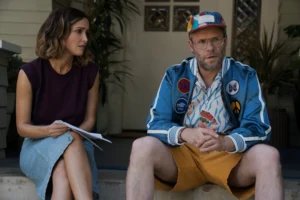Summary
A woeful French action-thriller with a detestable cast, a meandering script and scant pleasures, despite its tropical Thai setting.
Proving the venerable French are as prone to God-awful genre filmmaking as any other nation, Paradise Beach (Netflix) is a woeful action-thriller set in the seemingly lawless climes of Phuket, which is, coincidentally, what I imagine director Xavier Durringer and co-writer Jean Miez said aloud after finishing the first draft of the script.
That script — chewed threw in unenthusiastically dubbed English and random snippets of French by default — concerns a botched heist that lands Mehdi (Sami Bouajila) in prison for fifteen years. In the prologue, the gang wears scarves and balaclavas, but they’re still indistinguishable even when they’ve taken them off to live a party-hard life of small-scale entrepreneurship in Southern Thailand. By the time Mehdi joins them expecting a cut of the loot, they’re forced to reveal that a tsunami and tumultuous local politics mean they’re all flat broke.

Mehdi means to get them back on their feet and recoup his losses by starting a petty war of gangland tit-for-tat that plays out with the help of every imaginable genre cliche and several extended musical montages to showcase Thailand’s — and the gang’s — androgynous debauchery. Mehdi is the feared leader by virtue of having read Machiavelli, which he says aloud while chastising another member for spending the intervening decade-and-a-half sucking off ladyboys. Paradise Beach mistakes Mehdi’s passing familiarity with shrewd Rennaissance thinkers for a personality, much to its detriment.
It’s impossible to root for any of these people, and thus the film’s only pleasure is a bizarre quasi-artistic flourish by which each member of the gang is in turn erased from a group photograph as they’re killed, for various reasons and by various uninteresting perpetrators. If this is paradise, it’s overrated.




